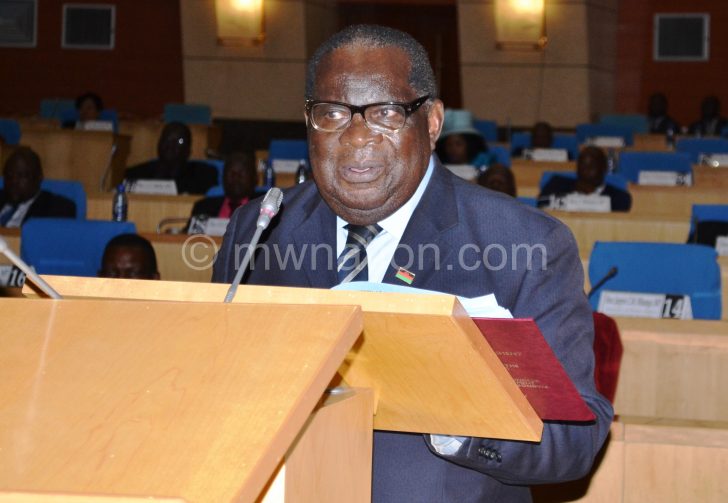Govt praised for sticking to fiscal rules
Government borrowing from the Reserve Bank of Malawi (RBM) has remained within legal borrowing limit, a development economists have described as the right direction towards the achievement of single digit inflation.
Economists also say by sticking to fiscal rules, government is creating a conducive environment for the private sector by not ‘crowding them out’ of the financial system.

The fiscal rules are in line with the RBM Amendment Act of 2015 which limits government’s borrowing from the central bank to 10 percent of domestic revenue. In the past government could borrow up to 20 percent.
In the recent financial years, government resorted to huge domestic borrowing from the central bank as a measure to finance huge fiscal gap created by the suspension of budget aid by donors in 2013 following the Cashgate scandal.
But RBM consolidated annual financial statements for the year ended December 31 2016 shows that the outstanding advances to government only stood at K3.4 billion and did not exceed the legal limit.
RBM spokesperson Mbane Ngwira said the central bank has been monitoring government borrowing since the enactment of the law to ensure government is in line with the law on borrowing.
According to Ngwira, the central bank sends to government reports that contain information on revenue collected, expenditure incurred, overall net position, financing, current and outstanding net position of Ways and Means Advances.
Weighing in on the development, Catholic University head of economics Gilbert Kachamba in a separate interview said continued government’s commitment to the RBM law on borrowing is imperative for the economy.
He said the sustained commitment would bring in financial discipline to the government and in the medium and long-term reduce government debts but also address the issue of inflation to some extent.
Said Kachamba: “We cannot completely rule out that fact that there is still a huge domestic debt stock. What we would want to see going forward is government following the fiscal policy. Malawi is one of the few countries on earth where fiscal policy is almost nonexistent.
“We would also was want to see a reduction in government spending and increase the tax base but these must be coupled with economic growth. Government has to come up with deliberate policies that will stimulate economic growth so as to reduce the tax burden on the population.”
In the 2016/17 Mid Year Budget Statement purse-keeper Minister of Finance, Economic Planning and Development Goodall Gondwe said government was committed to cut domestic borrowing.
He announced revised total expenditure from K1.14 trillion to K1.129 trillion representing a reduction of 1.7 percent in line with that goal.
He said the level of domestic borrowing agreed with the International Monetary Fund (IMF) under the Extended Credit Credit (ECF) is K60 billion, hence, government revised the budget in such a way that borrowing should be much less.
He said at the time: “The result of the fiscal operations during the first half of the financial year was an improvement in the fiscal deficit that required a domestic borrowing of only K25.1 billion instead of the IMF target of K40.1 billion.
“This means government is within the IMF target amount by some K15 billion which is a commendable result and means that our total operations were markedly sound.”
IMF in its recent missions highlighted the need for fiscal discipline to “consolidate emerging gains from ongoing policy reforms”, by spending within available resources.





